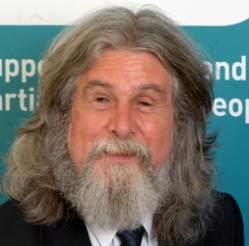Charities should consider ditching the word 'charity' in favour of social enterprise and must begin to view themselves "more as product developers and less as campaigners", RNIB chair Kevin Carey told the CFDG conference this morning.
In a wide-ranging and provocative opening plenary, Carey said the days of charities living "in the shadow of a dismissively bountiful state" are over.
The current tightening of public budgets is an opportunity, he said, for the sector to demonstrate "independence, enterprise, excellence and impact", and "for the sake of those we exist to serve, we must not let the opportunity pass".
Major changes required
But in order to progress in the current climate, Carey said, the sector must make some major changes in the way it perceives and presents itself.
First, it must increase its reach by providing good services to larger numbers of people, rather than "gold-plated" services to just a select few. "I think we should consider extending our reach not just for the sake of those we exist to serve," he said, "but because reach has implications for revenue. There will be an ever-greater tie-up between investors and service-users, manifested in the same person or people who know each other."
He also said charities might want to stop using the word 'charity' to describe themselves.
"We are going to have to think of ourselves more as product developers, wholesalers and retailers, and less as campaigners and contractors," Carey said. "Instead of seeing a problem and campaigning for somebody else to solve it, we need to solve it in parallel with a market analysis of how we can sell the solution."
He said that until now people have accepted that the sector campaigns and provides direct services, "but my contention is that balance will have to shift radically away from campaigning towards supplying".
He went on to say that while it might help some organisations to fundraise by calling themselves a charity, for others the term 'social enterprise' might send a better signal to policy-makers and potential investors.
"Many politicians and civil servants apparently think we are a bunch of amateur do-gooders to be picked up and thrown out of the pram like a baby's rattle," Carey said. "We are not taken seriously."
He couldn't resist his customary poke at the Charity Commission: "What makes us what we are is a regulatory framework based on Oliver Twist's workhouse, with all its condescension, amateurism and short-termism."
In future, charities will have to become more transparent about the way they spend money and what impact they have, in order to justify to donors the rationale that they "use donations to make rational subsidy allocations to services that people need but can't afford because the real price is too high".
Mergers and acquisitions
Trustees will also need to become much more willing to seriously consider all merger and acquisition options, and to stop putting the survival of their institution ahead of the needs of beneficiaries.
And lastly, Carey attacked the "double lock of poor perfomance and poor pay", saying society doesn't value charity personnel as highly as the public or private sector and that this won't change until charities get better at demonstrating their effectiveness and persuading their service users to speak up on their behalf.
He argued that the sector should be "developing and delivering social capital, and social goods and services".
"We have to fund what investors want and sell what people want to buy."









